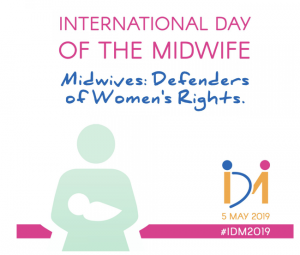Gov. Ige Signs Act to License Midwives
International Day of the Midwife “Midwives: Defenders of Women’s Rghts” is being celebrated Sunday, May 5, 2019, around the world, and Hawaiʻi is joining in by honoring midwives with a licensure law.
Gov. David Ige signed the bipartisan legislation to license midwives into law on April 30, 2019, as Act 32.
 The law was introduced as part of the Women’s Legislative Caucus Package to regulate midwifery practice in Hawaiʻi, providing public health protections through adoption and implementation of global and national standards for midwives. Act 32 provides exemptions for traditional Native Hawaiian healing practices, as they are protected under the State Constitution; and birth attendants until July 1, 2023 if disclosing they are practicing without a license. A task force is included in the law, which legislators have suggested be used by birth attendants to define themselves, their scope of practice and educational pathway for regulation by 2023.
The law was introduced as part of the Women’s Legislative Caucus Package to regulate midwifery practice in Hawaiʻi, providing public health protections through adoption and implementation of global and national standards for midwives. Act 32 provides exemptions for traditional Native Hawaiian healing practices, as they are protected under the State Constitution; and birth attendants until July 1, 2023 if disclosing they are practicing without a license. A task force is included in the law, which legislators have suggested be used by birth attendants to define themselves, their scope of practice and educational pathway for regulation by 2023.
Dani Dougherty, a certified professional midwife (CPM) on Hawaiʻi island who specializes in community based care, states “This bill has been a long time coming! Hawaiʻi families who choose community birth will have access to providers who are willing to prove their competency by meeting the appropriate educational, training and credentialing standards.” Dougherty intends to apply for licensure in 2020.
Midwives were regulated in Hawaiʻi from 1931 through 1998 through the Department of Health. The midwifery law was repealed when nurse-midwives were placed under the board of nursing, resulting in a lapse of midwifery regulation. Certified nurse-midwives have continued to be licensed as advanced practice registered nurses. Act 32 recognizes and provides a pathway to licensure for certified professional midwives and certified midwives in Hawaiʻi after 21 years of legislative efforts.
“Recognizing midwives is critical,” said Leʻa Minton, board president of Midwives Alliance of Hawaiʻi, “as they are part of the solution to our healthcare provider shortage, and they generally live and work in rural and neighbor island communities. There is a misperception that midwives only take care of pregnant women and deliver babies. This is definitely one aspect of their beloved care services, and midwives are also trained to provide well woman exams; pap smears; breast exams; counsel on reproductive life plans and some prescribe contraceptive methods; screen for sexually transmitted infections and some prescribe treatment; screen for depression, tobacco and substance use disorder, provide brief interventions and/or refer out as needed for treatment; and care for newborns in the first 4 to 6 weeks of life.”
“Licensing midwives recognizes them as part of the healthcare team, and provides the opportunity for them to work to their fullest scope of practice, which is when Hawaiʻi gains the maximum benefit of midwifery care,” said Minton. “We are so grateful to everyone who helped with this effort, to Gov. Ige for signing Act 32 into law, and we are absolutely thrilled with the opportunities that lie ahead!”












